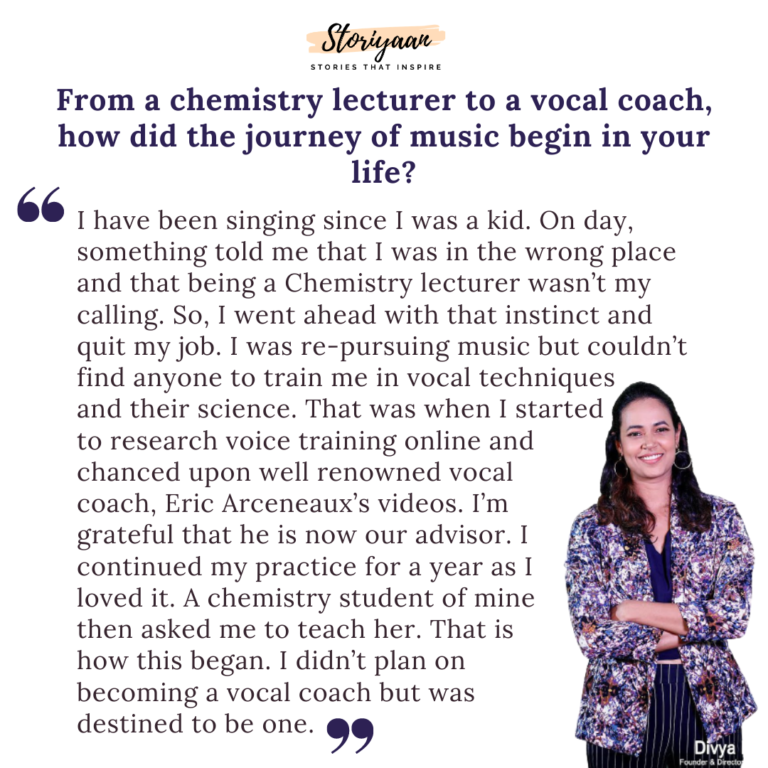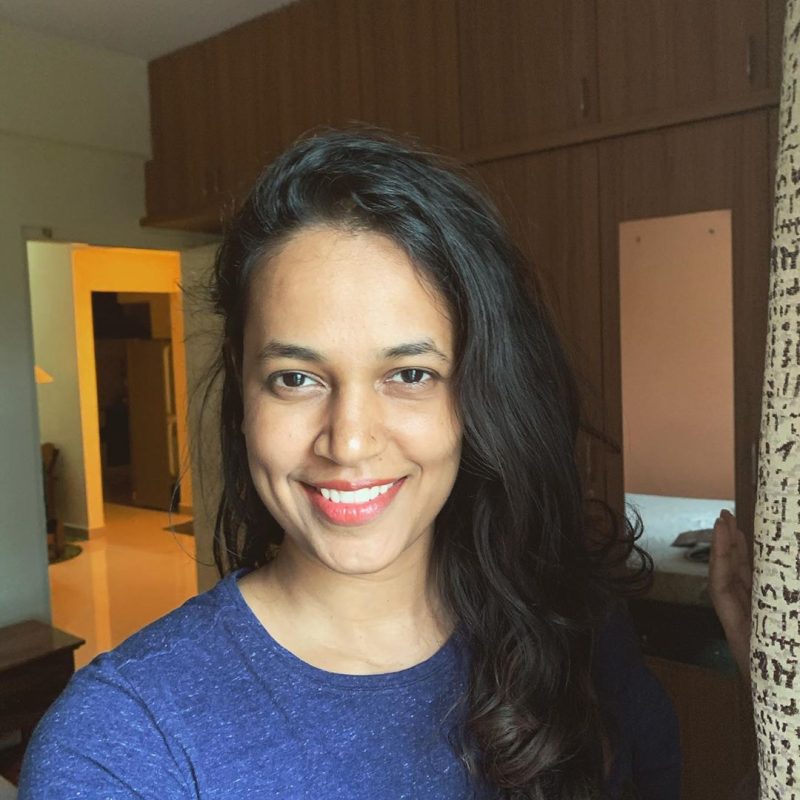Divya R.T. is a vocal coach, voice therapist and the Founder and Director of VOXCOACH, a professional voice training venture. She is also a multilingual singer and rapper and has gained accolades for her recently released first single, The Other Me. She is a former Chemistry lecturer, Mount Carmel College.

Interview
Questions and answers
From a chemistry lecturer to a vocal coach, how did the journey of music begin in your life?
I have been singing since I was a kid. One day, something told me that I was in the wrong place and that being a Chemistry lecturer wasn’t my calling. So, I went ahead with that instinct and quit my job. I was re-pursuing music but couldn’t find anyone to train me in vocal techniques and their science. That was when I started to research voice training online and chanced upon well renowned vocal coach, Eric Arceneaux’s videos. I’m grateful that he is now our advisor. I continued my practice for a year as I loved it. A chemistry student of mine then asked me to teach her. That is how this began. I didn’t plan on becoming a vocal coach but was destined to be one.
Talk to us about your recent track 'The Other Me'. Can you talk to us about the songwriting process and composition?
That’s a song which is very dear to me, that I released in April this year. I write when I feel strongly about a concept. I wrote it two years ago but only worked on it and put it out this year. As the name suggests, this song is about the other version(s) of me, or my alter egos. It highlights the conflicting personalities that we develop due to societal pressures, and how they mess with our state of being. In this song, my alter egos are conversing with one another. The vocal melody and lyrics are by myself whereas the track was produced by my friend, Semma Bass aka Vinod Subramani.
Could you tell us about singing styles and the one you find the most challenging to master?
I love to explore singing styles. The magic of voice techniques is that you can use them as tools to sing different styles. It’s always challenging to work with a new genre, but I make sure I figure it out. I’ve experimented with Hindi, Bollywood songs, Carnatic music, pop, rock etc as there is always the benefit of knowing what exactly your students need to fine tune. Rap, hip-hop and R&B are my go-to music genres.
In terms of vocal training, what are the basic differences in virtual and physical coaching?
I think the main difference is the contact. In the person’s vicinity, you feel the energy, and it’s a lot better for communication. Now, we don’t have another option but to take to the virtual world. If you know your subject well and are capable of engaging the other person, it works wonders even if it’s virtual.
How do you manage singing in different languages and training the students according to their choice of song?
You must know your voice related human machinery in and out. The second thing is understanding its functionality, followed by the effects on the vocal output. So, a combination of this knowledge with correctly executed voice exercises will get you the desired outcome. That’s how I manage to sing in different languages. But it works best if you know the language; that way it’s easy to emote and connect. Even if you don’t know the language, you can grasp the subject and the technical aspects of singing.
Can you take us through your process of maintaining your vocal cords?
The vocal cords are delicate. It’s essential to know about it from the get-go and take care of your voice. There are some ground rules that one needs to be aware of- Don’t have dairy or bread 1-2 hours prior to using your voice professionally. Excess saliva and mucus generated obstruct the vocalization process. Avoid cold food to avoid muscular contraction in the throat space, and avoid anything that raises your allergic reactions. So, knowing and understanding your body is significant. Do your vocal exercises everyday.
Does the 'Science of Voice' help with a better approach of understanding and enhancing the voice?
A 100%. Initially, I’d do my exercises blindly because I enjoyed the way my voice flowed and sounded. But tomorrow if I have a problem, then I’ll have to know which exercise will help me with what issue. So, it’s necessary to comprehend the science behind how the voice works.
Can you tell us a little about vocal therapy?
I started this journey of voice exploration about six years ago. I underwent a certification process after a few years as I was interested in becoming a voice therapist alongside of a vocal coach. Anyone suffering from vocal trauma, such as physical damage, or have disconnected vocal flow, voice that is breathy, breaking and cracking, can undergo this therapy. Vocal rest is advised as if you stop battering the voice, then probably the nodules, polyps, etc. which develop upon abrasion, will disappear on their own. Apart from that, one can greatly benefit from therapy involving breathing and voice exercises.

